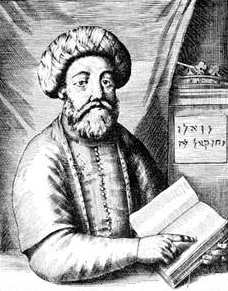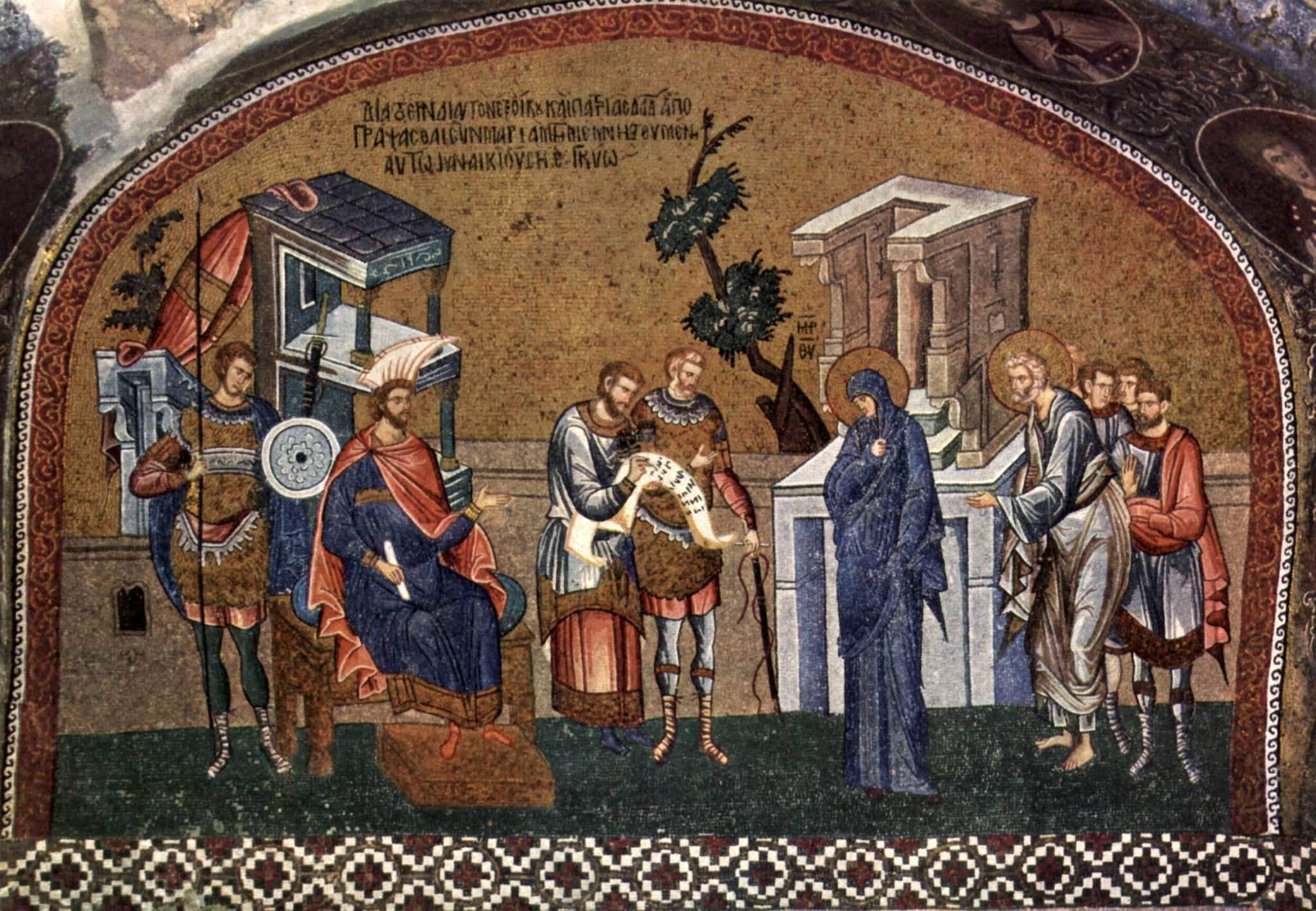|
Theudas
Theudas (; ; died c. 46 AD) was a Jewish rebel of the 1st century AD. Scholars attribute to his name a Greek etymology possibly meant as "flowing with water", although with a Hellenist-styled ending. At some point between 44 and 46 AD, Theudas led his followers in a short-lived revolt. The revolt The principal source for the story of Theudas' revolt is Josephus, who wrote: It came to pass, while Cuspius Fadus was procurator of Judea, that a certain charlatan, whose name was Theudas, persuaded a great part of the people to take their effects with them, and follow him to the Jordan river; for he told them he was a prophet, and that he would, by his own command, divide the river, and afford them an easy passage over it. Many were deluded by his words. However, Fadus did not permit them to make any advantage of his wild attempt, but sent a troop of horsemen out against them. After falling upon them unexpectedly, they slew many of them, and took many of them alive. They also took The ... [...More Info...] [...Related Items...] OR: [Wikipedia] [Google] [Baidu] |
Cuspius Fadus
Cuspius Fadus was an Ancient Roman '' eques'' and the 1st procurator of Iudaea Province in 44–46. History After the death of King Marcus Julius Agrippa, in 44, he was appointed procurator by Claudius. During his administration, peace was restored in the country, and the only disturbance was created by one Theudas, who came forward with the claim of being a prophet. But he and his followers were put to death by the command of Cuspius Fadus, as Josephus recounts: :"It came to pass, while Cuspius Fadus was procurator of Judea, that a certain charlatan, whose name was Theudas, persuaded a great part of the people to take their effects with them, and follow him to the Jordan river; for he told them he was a prophet, and that he would, by his own command, divide the river, and afford them an easy passage over it. Many were deluded by his words. However, Fadus did not permit them to make any advantage of his wild attempt, but sent a troop of horsemen out against them. After falling u ... [...More Info...] [...Related Items...] OR: [Wikipedia] [Google] [Baidu] |
Judas Of Galilee
Judas of Galilee, or Judas of Gamala, was a Jewish leader who led resistance to the census imposed for Roman tax purposes by Quirinius in Judea Province around 6 CE. He encouraged Jews not to register and those that did had their houses burnt and their cattle stolen by his followers. He is credited with beginning the " fourth philosophy" of the Jews which Josephus blames for the disastrous war with the Romans in 66–70. These events are discussed by Josephus in ''The Jewish War'' and in ''Antiquities of the Jews'' and mentioned in the Acts of the Apostles. In ''Antiquities of the Jews'', Josephus states that Judas, along with Zadok the Pharisee, founded the Zealots, the "fourth sect" of 1st century Judaism (the first three being the Sadducees, the Pharisees, and the Essenes). Josephus blamed this fourth sect for the First Jewish–Roman War of 66–73. The Zealots were theocratic nationalists who preached that God alone was the ruler of Israel and urged that no taxes should be ... [...More Info...] [...Related Items...] OR: [Wikipedia] [Google] [Baidu] |
List Of People Who Were Beheaded
The following is a list of people who were beheaded, arranged alphabetically by country or region and with date of decapitation. Special sections on "Religious figures" and "Fictional characters" are also appended. These individuals lost their heads intentionally (as a form of execution or posthumously). A list of people who were decapitated accidentally, including animal-related deaths, can be found at List of people who were decapitated. Austria *Joseph Haydn (1809) – celebrated composer posthumously beheaded; see Haydn's head Azerbaijan *Kyaram Sloyan (2016) - Kurdish Yazidi soldier, posthumously decapitated by Azerbaijani soldiers during the 2016 Nagorno-Karabakh conflict. Photos and videos of various soldiers posing with his severed head were widely circulated online after his death. *Genadi Petrosyan (2020) - ethnically Armenian citizen of the Nagorno-Karabakh Republic (Republic of Artsakh) beheaded by Azerbaijani soldiers during the 2020 Nagorno-Karabakh war. *Yur ... [...More Info...] [...Related Items...] OR: [Wikipedia] [Google] [Baidu] |
Judas The Galilean
Judas of Galilee, or Judas of Gamala, was a Jewish leader who led resistance to the census imposed for Roman tax purposes by Quirinius in Judea Province around 6 CE. He encouraged Jews not to register and those that did had their houses burnt and their cattle stolen by his followers. He is credited with beginning the " fourth philosophy" of the Jews which Josephus blames for the disastrous war with the Romans in 66–70. These events are discussed by Josephus in ''The Jewish War'' and in ''Antiquities of the Jews'' and mentioned in the Acts of the Apostles. In ''Antiquities of the Jews'', Josephus states that Judas, along with Zadok the Pharisee, founded the Zealots, the "fourth sect" of 1st century Judaism (the first three being the Sadducees, the Pharisees, and the Essenes). Josephus blamed this fourth sect for the First Jewish–Roman War of 66–73. The Zealots were theocratic nationalists who preached that God alone was the ruler of Israel and urged that no taxes should be ... [...More Info...] [...Related Items...] OR: [Wikipedia] [Google] [Baidu] |
Jewish Messiah Claimants
The messiah in Judaism means "anointed one" and included Jewish priests, prophets and kings such as David and Cyrus the Great. Later, especially after the failure of the Hasmonean Kingdom (37 BCE) and the Jewish–Roman wars (66–135 CE), the figure of the Jewish messiah was one who would deliver the Jews from oppression and usher in an Olam HaBa ("world to come") or Messianic Age. Some people were looking forward to a military leader who would defeat the Seleucid or Roman enemies and establish an independent Jewish kingdom. Others, like the author of the Psalms of Solomon, stated that the messiah was a charismatic teacher who would give the correct interpretation of Mosaic law, restore Israel, and judge mankind. This is a list of notable people who have been said to be the messiah ben David, either by themselves or by their followers. The list is divided into categories, which are sorted according to date of birth (where known). 1st century *Jesus of Nazareth (ca. 4 BC–30 ... [...More Info...] [...Related Items...] OR: [Wikipedia] [Google] [Baidu] |
Gamaliel
Gamaliel the Elder (; also spelled Gamliel; he, רַבַּן גַּמְלִיאֵל הַזָּקֵן ''Rabban Gamlīʾēl hazZāqēn''; grc-koi, Γαμαλιὴλ ὁ Πρεσβύτερος ''Gamaliēl ho Presbýteros''), or Rabban Gamaliel I, was a leading authority in the Sanhedrin in the early first century CE. He was the son of Simeon ben Hillel and grandson of the great Jewish teacher Hillel the Elder. He fathered Simeon ben Gamliel, who was named for Gamaliel's father, and a daughter, who married a priest named Simon ben Nathanael. In the Christian tradition, Gamaliel is recognized as a Pharisee doctor of Jewish Law. Acts of the Apostles, 5 speaks of Gamaliel as a man held in great esteem by all Jews and as the Jewish law teacher of Paul the Apostle in . Gamaliel encouraged his fellow Pharisees to show leniency to the apostles of Jesus Christ in . In Jewish tradition In the Talmud, Gamaliel is described as bearing the titles Nasi (Hebrew: נָשִׂיא ''Nā ... [...More Info...] [...Related Items...] OR: [Wikipedia] [Google] [Baidu] |
Census Of Quirinius
The Census of Quirinius is generally believed to be a census of Judea taken by Publius Sulpicius Quirinius, governor of Roman Syria, upon the imposition of direct Roman rule in 6 CE. The Gospel of Luke uses it to date the birth of Jesus, which the Gospel of Matthew places in the time of Herod the Great (who died between 5 BCE and 1 CE). Luke appears to have conflated Quirinius's census with the death of Herod, and most critical scholars acknowledge a confusion and misdating by Luke. Overview Herod I (Herod the Great, ), was a Roman client king whose territory included Judea. Upon his death, his kingdom was divided into three, each section ruled by one of his sons. In 6 CE, Emperor Augustus deposed Herod Archelaus, who had ruled the largest section, and converted his territory into the Roman province of Judea. Publius Sulpicius Quirinius, the legate (governor) of the province of Roman Syria starting in 6 CE, was assigned to carry out a census of the n ... [...More Info...] [...Related Items...] OR: [Wikipedia] [Google] [Baidu] |
Paul Barnett (bishop)
Paul William Barnett (born 23 September 1935) is an Australian Anglican bishop, ancient historian and New Testament scholar. He was the Bishop of North Sydney from 1990 to 2001. He is a prominent historical writer on the rise of Christianity and the historical Jesus. He is currently a fellow in ancient history at Macquarie University in Sydney, Australia and a teaching fellow at Regent College, Vancouver, Canada. Background Barnett holds a Master of Arts (MA Hons) from the University of Sydney, a Licentiate in Theology (ThL) from the Australian College of Theology, a Bachelor of Divinity (BD Hons) and a Doctor of Philosophy (PhD; London) on the interaction between the New Testament and Jewish history of the first century. His dissertation at the University of London was titled ''"The Jewish eschatalogical prophets A.D. 40-70 in their theological and political setting"''. "e isnow a teaching fellow at Regent College, Vancouver, ndis a respected classicist and historian." Ba ... [...More Info...] [...Related Items...] OR: [Wikipedia] [Google] [Baidu] |
Pulpit Commentary
The ''Pulpit Commentary'' is a homiletic commentary on the Bible created during the nineteenth century under the direction of Rev. Joseph S. Exell and Henry Donald Maurice Spence-Jones. It consists of 23 volumes with 22,000 pages and 95,000 entries, and was written over a 30-year period with 100 contributors. Rev. Joseph S. Exell M.A. served as the editor of ''Clerical World'', ''The Homiletical Quarterly'' and the ''Monthly Interpreter''. Exell was also the editor for several other large commentary sets like ''The Men of the Bible'', ''The Preacher's Homiletic Library'' and ''The Biblical Illustrator''. Henry Donald Maurice Spence-Jones was the Vicar and Rural Dean of St. Pancras, London and the principal of Gloucester Theological College Gloucester Theological College (1868–1897) was an Anglican theological college for the Diocese of Gloucester and Bristol in Gloucestershire, England. History The college was established in 1868 (formally opened in 1869) by Charle ... [...More Info...] [...Related Items...] OR: [Wikipedia] [Google] [Baidu] |
Year Of Birth Unknown
A year or annus is the orbital period of a planetary body, for example, the Earth, moving in its orbit around the Sun. Due to the Earth's axial tilt, the course of a year sees the passing of the seasons, marked by change in weather, the hours of daylight, and, consequently, vegetation and soil fertility. In temperate and subpolar regions around the planet, four seasons are generally recognized: spring, summer, autumn and winter. In tropical and subtropical regions, several geographical sectors do not present defined seasons; but in the seasonal tropics, the annual wet and dry seasons are recognized and tracked. A calendar year is an approximation of the number of days of the Earth's orbital period, as counted in a given calendar. The Gregorian calendar, or modern calendar, presents its calendar year to be either a common year of 365 days or a leap year of 366 days, as do the Julian calendars. For the Gregorian calendar, the average length of the calendar year ( ... [...More Info...] [...Related Items...] OR: [Wikipedia] [Google] [Baidu] |
1st-century Jews
The 1st century was the century spanning AD 1 (Roman numerals, I) through AD 100 (Roman numerals, C) according to the Julian calendar. It is often written as the or to distinguish it from the 1st century BC (or BCE) which preceded it. The 1st century is considered part of the Classical era, epoch, or History by period, historical period. The 1st century also saw the Christianity in the 1st century, appearance of Christianity. During this period, Europe, North Africa and the Near East fell under increasing domination by the Roman Empire, which continued expanding, most notably conquering Britain under the emperor Claudius (AD 43). The reforms introduced by Augustus during his long reign stabilized the empire after the turmoil of the previous century's civil wars. Later in the century the Julio-Claudian dynasty, which had been founded by Augustus, came to an end with the suicide of Nero in AD 68. There followed the famous Year of Four Emperors, a brief period of civil war and inst ... [...More Info...] [...Related Items...] OR: [Wikipedia] [Google] [Baidu] |
1st-century Executions
The 1st century was the century spanning AD 1 ( I) through AD 100 ( C) according to the Julian calendar. It is often written as the or to distinguish it from the 1st century BC (or BCE) which preceded it. The 1st century is considered part of the Classical era, epoch, or historical period. The 1st century also saw the appearance of Christianity. During this period, Europe, North Africa and the Near East fell under increasing domination by the Roman Empire, which continued expanding, most notably conquering Britain under the emperor Claudius (AD 43). The reforms introduced by Augustus during his long reign stabilized the empire after the turmoil of the previous century's civil wars. Later in the century the Julio-Claudian dynasty, which had been founded by Augustus, came to an end with the suicide of Nero in AD 68. There followed the famous Year of Four Emperors, a brief period of civil war and instability, which was finally brought to an end by Vespasian, ninth Roman emperor, a ... [...More Info...] [...Related Items...] OR: [Wikipedia] [Google] [Baidu] |






